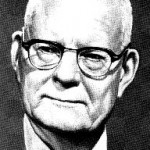Good Management Requires Empathy Above All
Posted on June 27, 2010
Filed Under Business, Technology | Leave a Comment
Nobody said being a manager is easy. Actually, being a good manager, being relationally successful with colleagues, superiors, customers or communities, can be very demanding. Especially if some of those folks are difficult themselves, which they can be.
So how does a manager prepare himself, or steel herself, for difficult days? This is an especially pertinent question for technologists whose training has been in abstractions and demanding details, not so much in relationships.
 Steve Roesler, a management consultant, makes a notable contribution to understanding what it takes to manage well in his All Things Workplace blog. He writes of the “Five Minds of a Manager”, yes five. But if you can get these traits and techniques in hand, corporate challenges are likely to go better.
Steve Roesler, a management consultant, makes a notable contribution to understanding what it takes to manage well in his All Things Workplace blog. He writes of the “Five Minds of a Manager”, yes five. But if you can get these traits and techniques in hand, corporate challenges are likely to go better.
Steve is actually quoting principles he came upon in an article entitled, uncannily, “Five Minds of a Manager” by Johnathan Gosling and Henry Mitzberg. (What he hasn’t done is provide a link to the piece. But Supermind Google advises that it was in The Harvard Business Review of November, 2003 – wisdom, of course, doesn’t have to be current.)
The five principles, actually “mindsets,” for relating well are what matter and here they are. They are days, we can recall, when we wish we had them all on tap and tuned tight:
1. Reflective mindset
“Stepping back and reflecting on experiences allow mistakes to be identified. Reflection may also lead to seeing things in a new ways, e.g., a product as a service or customers as partners (or vice versa).”
2. Analytical mindset
“Go beyond crunching the numbers. When a decision must be made, analyze the analysis of others to determine the biases they may have had and the data and assumptions used.”
3. Wordly mindset
There are lots of worlds within the world and cultural awareness is crucial.
4. Collaborative mindset
Don’t hole up in your office – get out and mingle with your staff and customers, and listen more than direct.
5. Action mindset
“Managers with action mindsets focus organizational energy on changing what needs to be changed while carefully maintaining what doesn’t.”
Yes, these are all important vantage points. But we might suggest one overarching principle that’s indispensable for successful managing – empathy, walking in someone else’s shoes and identifying with what’s firing them up. Be sure, in other words, to relate well to those shaping your managerial world. – Doug Bedell
Photo – FreeDigialPhotos.net
Kevin Costner’s Moxie in the Gulf
Posted on May 26, 2010
Filed Under Business, Technology | Leave a Comment
Another blog got to this first, but if you’re Kevin Costner with a good idea, we have to agree, Field of Dreams-like, “He built it, so let him come.”
In this instance, we’re referring to Costner’s centrifugal oil separation machines, which are being checked out by BP in the Gulf of Mexico. They’ve been developed by Costner’s company, with $24 million of his own money and the wonderfully appropriate name of Ocean Therapy Solutions.
 A great technical tale appears to be unfolding here, powered by a visionary sense of environmental utility that was triggered by the Exxon Valdez spill in 1989. Kostner was ticked off about that, big time. So, as The New York Times’ Green blog reports, he bought the emerging centrifugal technology from the government and invested heavily in getting it ready for another big spill.
A great technical tale appears to be unfolding here, powered by a visionary sense of environmental utility that was triggered by the Exxon Valdez spill in 1989. Kostner was ticked off about that, big time. So, as The New York Times’ Green blog reports, he bought the emerging centrifugal technology from the government and invested heavily in getting it ready for another big spill.
Perhaps providentially for Costner, along came BP’s gulf spill. The oil giant has approved six of Ocean Therapy’s 32 machines for testing. They’re supposed to, says The New York Times, “suck oil from water, separate the oil, store it in a tanker and send the water, 99.9 percent purified, back into the gulf.”
Costner is confident they’ll do just that. “I’m very happy the light of day has come to this,” he said at a news conference in New Orleans, explaining he was “very sad” about the spill “but this is why it’s developed (the centrifugal technology).” Costner’s barrel-like machines will be mounted on barges and trundled out to spin oil from water. Details of any contractual relationship between BP and Costner, should the machines indeed work, have not be disclosed, The Los Angeles Times reports.
This is the way it is with technology – an idea and the vision to extend it, the ingenuity to perfect it, and the commitment of resources, personal or borrowed, to prove it out. All those images of “Waterworld,” “Field of Dreams” and other Costner films that flickered on so many movie screens around the world may now be contributing to a happier reality than would have been likely without Costner’s moxie, providing he’s proven out, which many people along the gulf are hoping for.
Right on, Kevin! – Doug Bedell
Information Isn’t Knowledge, and We’re Drowning In It
Posted on May 9, 2010
Filed Under Business, Technology | Leave a Comment
Phil Murray argues in a meaty article in KM World that we’re paying too much attention to information, trying too hard to cope with its rising tides, and not enough to meaning. He’s got a point, a truly profound one, actually.
 We’re preoccupied, for instance, with all the coverage of possible damage from the BP oil spill, and not giving enough attention, at least not yet, to whether it’s smart to drill in 5,000 feet of water in the first place. We’ve had the information that it can be done, but is it wise to do it? What’s the current meaning of our energy situation, anyway? In what context are we looking at that?
We’re preoccupied, for instance, with all the coverage of possible damage from the BP oil spill, and not giving enough attention, at least not yet, to whether it’s smart to drill in 5,000 feet of water in the first place. We’ve had the information that it can be done, but is it wise to do it? What’s the current meaning of our energy situation, anyway? In what context are we looking at that?
“Meaning? Yes, ‘the thing one intends to convey especially by language,’ according to the Merriam Webster dictionary,” Murray writes. “…The connections among things. Causes and effects. In the context of work: the relevance or importance of those connections. The subject of logic, argument and epistemology. A pervasive, essential aspect of rational human activities that is accepted as critical to creation of value and economic progress, and yet an idea routinely dismissed as unusable, elusive and unmanageable at the same time…” So keep piling up the information, without asking whether it’s really worth the risk of an explosive gas bubble surging up from the ocean floor.
Knowledge is information refined by a disciplined approach to reality exercised on a different plane than those of incoming flows or profit projections.
These sorts of things ought to be concerns for knowledge workers everywhere, Murray (whose article went to press a couple of months before the BP spill) rightly insists.
“The stunning reality is that we, as knowledge workers, often spend more than half our time doing work that has no formal description, no standards for best practices and no appropriate metrics. What’s more, that work is not formally or explicity connected to specific outcomes, whether they are services or products.”
So let’s try hard to get focused on relationships and meaning, along with information. That’s where the real value in knowledge work (I almost slipped and said “intellectual work” ) lies.
Murray’s lengthy piece is one to ponder and pass along, seriously. – Doug Bedell
Illustration courtesy of freedigitalphotos.net.
Bank Closings ‘In Perspective’
Posted on March 26, 2010
Filed Under Business | Leave a Comment
It’s work these days to keep things in perspective but it’s worth the effort. For instance, we’ve just had the 41st bank closing in 2010. Forty-one banks shuttered, and the year isn’t three months old. Sounds like a lot, doesn’t it? Not really, maybe.
When you head over to the Federal Deposit Insurance Corp.’s website, you find that there were “thousands” of bank failures in the 1920s and early 1930s, which, as we know, led to the formation of the FDIC itself.
Now when a bank closes, depositors are insured up to $250,000 per account so nobody looses any money, unless they foolishly kept more than a quarter million in a given account.
The four banks that were just closed will cost the FDIC insurance fund around $320.3 million and $100 billion is expected to be needed to cover failed banks over the next four years. But no matter, the FDIC currently has $66 billion in cash and securities in reserve, and the government is likely good for the rest.
 So get inured to bank closings, they’re nothing to lose sleep over anymore. Neither are continued layoffs by state governments, nor the problems young people are having finding jobs – the recovery is gaining strength, isn’t it?
So get inured to bank closings, they’re nothing to lose sleep over anymore. Neither are continued layoffs by state governments, nor the problems young people are having finding jobs – the recovery is gaining strength, isn’t it?
© iStockphoto/ilbusca
Unsettling times indeed. They call for policies to unleash the creativity and ability available in the American people. We don’t know quite what those policies ought to be, but we were heartened to hear that part of the supplemental health care bill that Congress just passed to “fix” the first one included “education provisions that help students with loan payments.
“The education related initiatives funded by the law are fully paid for by ending the government subsidies currently given to banks and other financial institutions that make guaranteed federal student loans,” the White House said in a statement.
So maybe the banks aren’t getting entirely solicitous treatment after all. Hard to say.
Wherever we’re headed, we certainly feel there’s a role for creative, compassionate government, one that unlocks potential and doesn’t simply hoard whatever it is that anti-government politicians seem to feel needs hoarding.
Do your job Washington, and keep us informed every step of the way. We’re rooting for you. And we’re keeping those bank closings “in perspective.” – Doug Bedell
A Green Brownfield… Now that’s an Idea Worth Pursuing!
Posted on March 16, 2010
Filed Under Business, Technology | Leave a Comment
Whenever engineers gather—particularly engineers whose hairlines are either receding or tinged with gray—the conversation often turns to the sad state of infrastructure renewal in this country. Those engineers recall the “old days” when either they or their fathers (sorry, very few female engineers in those days) worked on large projects that were actually conceived, approved, and built on budget and on schedule.
The contract for Hoover Dam was awarded in 1931 and the dam was dedicated in 1935, two years ahead of schedule and about $15,000,000 (30%) under budget. Imagine trying to obtain approval today for that project, or for the approximately 47,000 mile Interstate Highway System, a national treasure that accounts for about one-third of all miles Americans drive. Today we are hard-pressed to build a much needed power plant (green or not) or bridge, let alone something of real national significance (such as Yucca Mountain… billions spent for naught).
 Perhaps a new push by the EPA and DOE will help reverse this dreadful record, at least for some of the less controversial infrastructure projects. According to an Energybiz Insider article, those agencies are considering regulations to encourage renewable energy plants (solar, wind, and hydro) on brownfields, that is, contaminated and abandoned industrial sites. Every state has such sites, and they total about 450,000 acres in the U.S.
Perhaps a new push by the EPA and DOE will help reverse this dreadful record, at least for some of the less controversial infrastructure projects. According to an Energybiz Insider article, those agencies are considering regulations to encourage renewable energy plants (solar, wind, and hydro) on brownfields, that is, contaminated and abandoned industrial sites. Every state has such sites, and they total about 450,000 acres in the U.S.
The article cites a few such success stories, including an abandoned steel mill in New York that is now home to a wind farm, and a U.S. Army facility in Colorado where solar electric panels have been installed. One hopes that even the hardcore NIMBYs might prefer a green energy power plant—however modest in output—to an abandoned, chemical-laden brownfield in their communities. Then again, if the chemical soup on the site caused algae to mutate into a deadly new life form I’m sure there would be intervenors carrying “Save the Scum” placards. — Dennis Owen
Quality Requires Recall – Before Recalls
Posted on February 26, 2010
Filed Under Business | 2 Comments
Oh, my goodness. There was American statistician W. Edwards Deming addressing a group of Japanese industrialists in 1950, at the Mt. Hakone Conference Center, on the subject of statistical product quality administration, which had been introduced in the U.S. in the 1940s.
 “The knowledge and brains applied to statistics by the Japanese are an essential national resource; it is important in the same way as water power, forests, and railroads,” Dr. Deming told his attentive listenders, “And that statistical knowledge, much like water power, is not useful at all unless it has an impact on work opportunity and work (itself).”
“The knowledge and brains applied to statistics by the Japanese are an essential national resource; it is important in the same way as water power, forests, and railroads,” Dr. Deming told his attentive listenders, “And that statistical knowledge, much like water power, is not useful at all unless it has an impact on work opportunity and work (itself).”
There’s more: “However, no matter how excellent your technicians, you who are leaders, must strive for advances in the improvement of product quality and uniformity if your technicians are to be able to make improvements. The first step, therefore, belongs with management,” Dr. Deming told those Japanese executives. “First, your company technicians and your factories must know that you have a fervor for advancing product quality and uniformity and a sense of responsibility for product quality.”
All the apologies we have been hearing from Toyota executives of late would not have been necessary if they had kept Dr. Deming’s words before them. It’s profoundly interesting that the quality movement that Dr. Deming’s 1950 lectures spurred in Japan did not take hold in the U.S. until the 1980s, when Dr. Deming had to be “discovered” by NBC television at his home in Bethesda, Md. By then, Japanese attention to quality was almost legendary, but it always depended, and continues to depend, on management’s commitment to its principles.
So, when you have James Treece, of Automotive News, a veteran Toyota observer, noting that “Toyota has a deep preference for secrecy rather than openness,” which produces “arrogance, complacency, and understaffing,” you realize the importance not only of initial learning, but of learning that’s continually reinforced by alert executive leadership.
Dr. Deming had been invited to Japan by General MacArthur to help with the 1951 Japanese census. He found Japanese business executives despairing that they would never be known for producing anything but junk. When he encountered some Japanese statisticians interested in promoting quality control, he rallied them. Next, their managers.
“In the last ten years,” Dr. Deming continued in his Mt. Hakone talk, “there has been no scientific method which has experienced such rapid expansion as has statistical theory. In the context of today’s Japan, the most useful thing for manufacturers could be nothing but the appropriate application of statistical techniques.”
The rest became Japanese and world industrial history – and dismay, when a company like Toyota overlooks quality’s grounding principles – awareness, persistence and honesty. (Such as trending consumer complaints of acceleration problems, and responding to them promptly.)
Quality principles don’t have to be reinvented; they have to be recalled and remembered. – Doug Bedell
What Toyota Apparently Forgot
Posted on February 11, 2010
Filed Under Business | Leave a Comment
Strange what gets in the way of cultural and business history and learning. In the 1980’s, Japan was the only overseas nation that took General Public Utilities (GPU) up on its offer to participate in the cleanup of Three Mile Island Unit 2 and learn from it. The Japanese impressed us at TMI as avid learners, a quality we assumed spread across their industrial culture.
Yet what has Toyota possibly overlooked about corporate risks? Not only some of the finer points of industrial quality control, it appears, but of crisis communication as well – factors that the Japanese engineers at TMI observed fairly closely.
 Remember that workers on a Japanese assembly line – gemba crews – can stop the line at will whenever they observe a quality lapse. But suppose the issue is more subtle, not readily apparent to production workers? Where was the engineering attentiveness to possible acceleration problems? And in crisis terms, why did it take Toyota months to acknowledge it had a safety problem it should have advised its customers about?
Remember that workers on a Japanese assembly line – gemba crews – can stop the line at will whenever they observe a quality lapse. But suppose the issue is more subtle, not readily apparent to production workers? Where was the engineering attentiveness to possible acceleration problems? And in crisis terms, why did it take Toyota months to acknowledge it had a safety problem it should have advised its customers about?
Writing for Business Week, Jeffrey Liker, an author of six books about Toyota, says concerns about its apparent quality lapses are overdone. We hope he’s right. Yet something is amiss when concerns over a corporation’s responsiveness balloon to the point of threatening its survival.
It’s not just the ability to take safety issues seriously at the highest levels that matters, but to act promptly and effectively on them once they’re recognized. No matter how vaunted an organization may be, sloppiness can creep in. Procedures to avoid that have to be maintained. Management needs always to be attentive and candid.
The 1979 accident at Three Mile Island Unit 2 wasn’t as threatening to the public as it was initially perceived, either. Yet, because of the ineffective manner in which it was experienced and communicated in its early stages, the Unit 2 accident caused a lack of confidence that produced a 30-year U.S. nuclear power stalemate. The Japanese at TMI undoubtedly took an awareness of what was unfolding there home with them. We’re left wondering, though, how deeply it influenced their business culture overall.
Toyota’s cars are fueled by public confidence that, fairly or not, seems suddenly in jeopardy. Public support can be lost, just like that. Must a lesson so dire be learned repeatedly? – Doug Bedell
Suppose Your Were the Last of Your Kind
Posted on February 5, 2010
Filed Under Business | Leave a Comment
Picture yourself as the last living representative of your craft or business. What state would you want to leave them in for whomever else might be interested in your life’s role?
Such epochal thoughts occurred to us in reading about the passing of Boa Sr in the Andaman Islands, the last living member of one of the world’s oldest tribal cultures.
Where are the Andaman Islands? They’re out in the Bay of Bengal, not too far from India, which governs them. But no matter where Boa Sr, or you, were or are located, the idea of being the last living representative of a culture stirs us.
 Boa Sr lived through a tsunami and the Japanese occupation of her homeland and was the last native in her island chain who was fluent in Bo, a 65,000-year-old. originally Neolithic (New Stone Age) culture. For several years until she died recently, she had no one else to speak her native language to. (Bo is one of 10 Great Adamanese languages.)
Boa Sr lived through a tsunami and the Japanese occupation of her homeland and was the last native in her island chain who was fluent in Bo, a 65,000-year-old. originally Neolithic (New Stone Age) culture. For several years until she died recently, she had no one else to speak her native language to. (Bo is one of 10 Great Adamanese languages.)
So, you may ask, suppose we were the last living representatives of our culture, craft or way of life? What imprint would we be leaving on history’s parchment? An idle question? Not at all. For we will be leaving a recollection of who we were, and how we dealt with others, among our friends and associates, at least.
There’s something especially poignant about noting the passing of Boa Sr, for she was the last of an entire culture. Until roads were built in the 1970s, her Adamanese people resisted colonizers and missionaries from the forests of their homeland. We don’t live in forests, but what culture, what accomplishments, what imprint are we creating for posterity to recall?
Boa Sr’s death reminds us that this isn’t a playful question. It’s a cultural one, involving the culture that we’re creating and, one day, will be leaving, too. Like Boa Sr, we are all, in our own settings, aspects of a creation that keeps passing and recreating itself. With other players, or maybe none. – Doug Bedell
Evolutionary Superiority
Posted on February 4, 2010
Filed Under Business | 2 Comments
Evolutionary Superiority, now that’s a powerful phrase… wouldn’t it make you feel puffed up to be able to apply that description to yourself? My friend, colleague, and fellow Insights blogger, Doug Bedell, has found some primate research from Harvard University that suggests that if you have one of the more annoying human traits—grumpiness—then you may qualify as evolutionarily superior.
The details are here, but basically the idea is that ape species that can set aside their natural tendency for playfulness now and again and get pissed off about something (chimpanzees) are more civilized and accomplished than their always playful peers (bonobos). I have to say I’m skeptical about applying this research to human evolution, but I’ve seen first hand how this research applies to life in the business world.
In large, hierarchical, and highly structured organizations I’ve worked with (think government agencies), too many workers go along to get along, and consequently things (processes, systems, rules, databases, paperwork, whatever) evolve slowly, if at all. It takes the rare grumpy man or woman (read that as annoyed, impatient, and “I’m mad as hell and I’m not going to take this anymore”*) to force change and make the organization evolve in some small way. I contrast that with some of the more  sharp, nimble, and evolve-or-die companies I’ve written for, which seem to be full of impatient and grumpy (but not uncivilized) people who are frequently unsatisfied and want things changed… now!.
sharp, nimble, and evolve-or-die companies I’ve written for, which seem to be full of impatient and grumpy (but not uncivilized) people who are frequently unsatisfied and want things changed… now!.
The next time a colleague annoys you with a stubborn, grumpy, and get-with-the-program attitude, give him or her a hug (to hell with political correctness and harassment policies). They may be saving your career. – Dennis Owen
* Thanks to dailymotion.com
« go backRecently
- Presentations With Forethought
- Technical Writing’s Lineage – Surely It’s Deeper than Digital
- At the Holidays, Twitting Amazon
- Successful Cookie Baking – From Mom, an Acknowledged Expert
- Slides for a Tech Writer’s Craft
- Digital or Not, Be Clear
- Being Watchful About Digital Designs…
- When Proposals Don’t Click, Keep Making Them Anyway
- Like a Good Gardener, Help an Enterprise Keep Itself Current
- We’re Leaders All, And Need to Think That Way
Categories
Archives
- January 2017
- December 2016
- November 2016
- October 2016
- September 2016
- August 2016
- July 2016
- June 2016
- May 2016
- April 2016
- March 2016
- February 2016
- January 2016
- December 2015
- November 2015
- October 2015
- September 2015
- August 2015
- July 2015
- June 2015
- May 2015
- April 2015
- March 2015
- February 2015
- January 2015
- December 2014
- November 2014
- October 2014
- March 2014
- February 2014
- January 2014
- December 2013
- November 2013
- October 2013
- September 2013
- August 2013
- July 2013
- June 2013
- May 2013
- April 2013
- March 2013
- February 2013
- January 2013
- December 2012
- November 2012
- October 2012
- September 2012
- August 2012
- July 2012
- June 2012
- May 2012
- April 2012
- March 2012
- February 2012
- January 2012
- December 2011
- November 2011
- October 2011
- September 2011
- August 2011
- July 2011
- June 2011
- May 2011
- April 2011
- March 2011
- February 2011
- January 2011
- December 2010
- November 2010
- October 2010
- September 2010
- August 2010
- July 2010
- June 2010
- May 2010
- April 2010
- March 2010
- February 2010
- January 2010